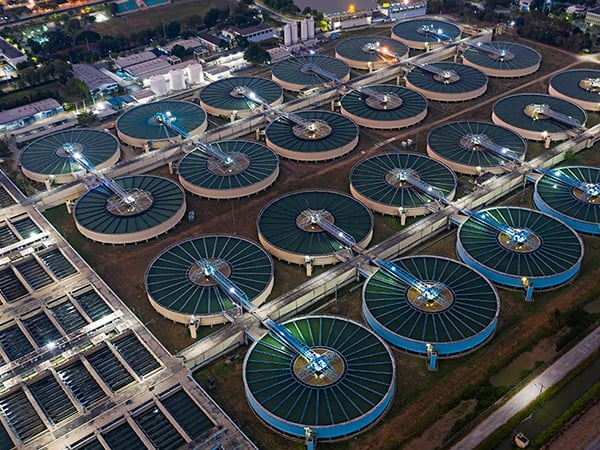Amidst the growing need for energy and increasingly pressing environmental issues, renewable energy is at the forefront of global discussions. Renewable energy, sourced from constantly renewing natural processes such as the sun, wind and water, offers an important solution to today's environmental challenges. However, wastewater, the result of domestic and industrial activities, is often overlooked as a potential source of renewable energy. Innovative processes can process liquid waste into biogas, a renewable energy source that can be used for a variety of purposes, from cooking to fueling vehicles.

Liquid Waste Treatment Technology
Technological developments have made it possible to convert liquid waste into renewable energy more efficiently. Liquid waste treatment technologies, such as anaerobic digestion, play a key role in this process, converting organic waste into biogas that can be used as fuel. Anaerobic digestion is a biological process that involves microorganisms to decompose organic matter under anaerobic conditions (without oxygen), producing methane and carbon dioxide as the main products. This resulting biogas, rich in methane, can be utilized as an efficient energy source, supporting electricity production and heating, as well as fuel for vehicles.
In addition to anaerobic digestion, other technologies such as microalgae-based sewage treatment also show great potential. Microalgae can grow on wastewater and use the nutrients contained in it to grow, while producing biomass that can be converted into biofuel. This technology not only generates renewable energy but also helps in reducing the excess nutrient content in the effluent, which can cause eutrophication problems in the waters.
The application of wastewater treatment technology has also shown great potential.
The application of modern wastewater treatment technologies also involves purifying and reusing wastewater as an additional water resource, reducing the pressure on clean water resources. As such, these technologies not only increase the availability of renewable energy but also contribute to the sustainable management of water resources.
Development and implementation of efficient wastewater treatment technologies requires significant initial investment, but the long-term benefits offered in terms of reduced greenhouse gas emissions, increased renewable energy availability, and more sustainable resource management, make it a worthwhile investment. The key to the successful implementation of these technologies lies in their integration in energy and environmental policies, as well as cooperation between the government, industrial sector, and society.
With the ongoing advancement of these technologies, it is important that they are integrated into energy and environmental policies.
With ongoing technological advancements, the potential for innovation in wastewater treatment is increasing. For example, the development of technologies to purify biogas into biomethane, which has qualities equivalent to natural gas, opens up opportunities for the use of renewable energy on a wider scale. In addition, the integration of effluent treatment systems with other technologies, such as solar power systems or rain collection systems, can improve the overall efficiency and sustainability of sewage treatment plants.
Therefore, effluent treatment technology is becoming more and more popular.
Therefore, wastewater treatment technologies are an important component in renewable energy strategies and environmental management. With increased efficiency, reduced environmental impact, and contribution to resource availability, these technologies offer a comprehensive solution to today's energy and environmental challenges. Investments in research and development, as well as the adoption of supportive policies, will ensure that wastewater treatment technologies continue to contribute to a sustainable energy future and a healthier environment.
 Figure>.
Figure>.
Potential of Liquid Waste as Renewable Energy
Indonesia, with its large population and rapidly growing industrial sector, faces the challenge of managing the volume of liquid waste generated every day. This liquid waste, coming from various sources such as households, agriculture, and industry, has an untapped potential to be converted into renewable energy, especially biogas. The process of converting liquid waste into biogas not only offers a solution to reduce the burden of waste in the environment, but also opens up opportunities to produce alternative energy sources that can significantly support national energy needs.
The utilization of liquid waste as a source of renewable energy is an important step in the development of renewable energy.
The utilization of wastewater as a renewable energy source has several advantages. First, it helps reduce greenhouse gas emissions by replacing the use of fossil fuels with biogas, which is clean energy. Second, the process supports sustainable recycling and waste management efforts, reducing water and soil pollution caused by the disposal of wastewater without adequate treatment. Thirdly, with the right treatment technology, wastewater can be processed into biogas with high efficiency, providing a reliable and sustainable source of energy.
In addition, the development and implementation of wastewater treatment systems for renewable energy production can drive innovation and economic growth. Investment in wastewater treatment technologies can create new jobs and build domestic industrial capacity. Thus, it not only addresses waste and energy issues but also contributes to sustainable economic development.
In the future, with a renewable energy approach, the use of wastewater as a renewable energy source will increase.
In the future, with an integrated and sustainable approach, wastewater can be transformed into one of the important pillars in Indonesia's renewable energy portfolio. This will not only help Indonesia in addressing its environmental and energy challenges but also position the country as a leader in the use of innovative and sustainable renewable energy at the regional as well as global level."

Environmental and Economic Benefits
The utilization of wastewater effluent as an energy source not only supports environmental sustainability but also offers significant economic benefits. From an environmental perspective, the conversion of wastewater effluent into renewable energy contributes to a significant reduction in greenhouse gas emissions, an important step in global efforts to address climate change. Treatment of liquid waste through methods such as anaerobic digestion reduces the volume of waste that must be discharged into the environment, minimizing water and soil pollution that can be caused by discharging waste without adequate treatment. The process also reduces reliance on traditional waste disposal, such as landfills, which are often associated with the production of methane, a potent greenhouse gas greater than carbon dioxide.
In addition to reducing negative environmental impacts, utilizing wastewater as an energy source offers extensive economic benefits. Economically, it can significantly reduce waste and energy management costs for local governments and industry, by providing a treatment method that converts costs into revenue. The process of processing wastewater effluent into renewable energy creates new employment opportunities within the renewable energy sector, from operation and maintenance of treatment facilities to research and development of new technologies. This can help strengthen local and national economies, providing a boost to the growth of the renewable energy industry.
The use of energy generated from wastewater can also reduce dependence on fossil energy sources, whose prices tend to fluctuate and can improve a country's energy security. By developing infrastructure for renewable energy, countries can reduce fossil fuel imports, increase energy security, and support sustainable economic development. In addition, investments in renewable energy technologies are often incentivized by governments, including subsidies and tax credits, which can offer additional financial benefits to companies and communities involved in wastewater treatment.
On the other hand, the development of a market for renewable energy is a key factor in the development of a renewable energy market.
On the other hand, the development of markets for products resulting from wastewater treatment, such as biogas and biofertilizer, can encourage innovation and diversification within the agricultural and energy sectors. Biofertilizer, for example, is a by-product of the anaerobic digestion process that can improve soil fertility and reduce dependence on chemical fertilizers. This creates a sustainable cycle that benefits both the environment and the economy, by integrating energy and agricultural production systems.
Overall, utilizing wastewater effluent as a renewable energy source offers a comprehensive solution that supports environmental sustainability and economic growth. By implementing effective and sustainable strategies for wastewater treatment, communities can capitalize on significant environmental and economic benefits, strengthening global efforts towards a greener and more prosperous future.
Conclusions and Way Forward
The development of wastewater effluent as a renewable energy source offers a promising solution to some of the environmental and energy challenges faced today. It requires concerted efforts from government, industry, and society to realize this full potential. Through technological innovation and effective cooperation, Indonesia can take a major step towards a more sustainable and environmentally friendly energy future. The key to the success of this initiative lies in the willingness to invest in research and development, build the necessary infrastructure, and adopt policies that support the use of renewable energy.
To take this a step further, Indonesia needs to make a concerted effort.
To go further, governments need to play an important role in providing a supportive policy framework, including incentives for investment in wastewater treatment technologies and renewable energy use. This could include subsidies, tax breaks, and technical assistance to facilitate the transition to clean energy. In addition, the development of clear standards and regulations for the treatment and utilization of wastewater effluent as an energy source is crucial to ensure safe and efficient practices.
Industry, on the other hand, is a major player in the energy sector.
Industries, on the other hand, must commit to adopting sustainable wastewater treatment technologies and utilize the renewable energy generated. This will not only help reduce the environmental impact of their operations but also improve efficiency and reduce long-term operational costs. Cooperation between industries and with research institutions can accelerate innovation and deployment of new technologies.
The community also has an important role to play in supporting the transition to renewable energy. Awareness of and active participation in recycling and waste management programs, as well as support for sustainable policies and initiatives, can help drive demand for clean energy and strengthen collective efforts to protect the environment.
Future steps should include increasing demand for clean energy, as well as increasing the number of renewable energy sources.
The way forward should include increasing international collaboration in renewable energy research and development, sharing knowledge and best practices, and accessing international financing for clean energy projects. By doing so, Indonesia can not only sustainably meet its own energy needs but also contribute to global efforts in addressing climate change.
In concluding, the development of wastewater effluent is an important part of Indonesia's future.
In conclusion, the development of wastewater as a renewable energy source is an important step towards a greener and more sustainable future. With a coordinated approach and commitment from all parties, the full potential of this energy source can be realized, providing significant environmental and economic benefits to Indonesia and the world. It marks an important step in the global journey towards sustainability, where renewable energy plays a key role in securing the future of our planet.
